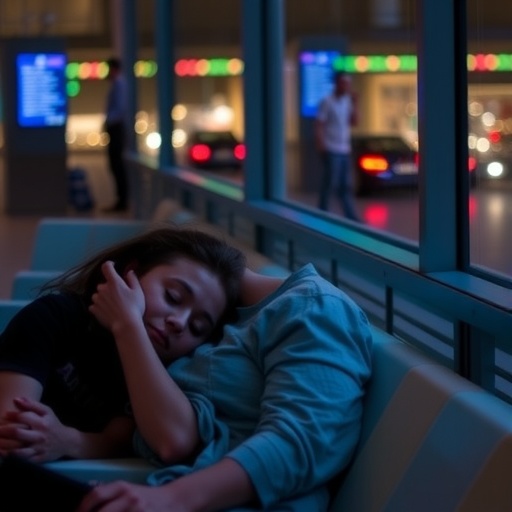In recent years, the phenomenon of social jetlag has captured the attention of scientists and mental health professionals alike due to its growing prevalence and profound impact on psychological well-being. Defined as the misalignment between an individual’s biological circadian rhythms and socially imposed schedules, social jetlag is particularly commonplace among adolescents and young adults. A new comprehensive meta-analysis published in BMC Psychiatry delves into this issue by examining its specific association with depressive symptoms across a youthful demographic aged 10 to 24 years.
The study brings to light the disturbing reality that social jetlag is not merely a benign inconvenience but poses tangible risks for mental health. Social jetlag arises when a person’s natural sleep-wake cycle clashes with external demands such as school or work schedules, causing shifts in sleep timing between weekdays and weekends. This leads to chronic disturbances in circadian biology, which are intricately tied to mood regulation and cognitive function. The current systematic review aggregates data from eight rigorously selected studies to quantify the strength and nature of this relationship in young people.
Methodologically, the researchers employed a robust search strategy spanning multiple databases—including PubMed, Cochrane Library, Embase, and Web of Science—covering records up to early May 2024. They carefully assessed study quality via the Newcastle-Ottawa Scale, ensuring that only high-caliber evidence contributed to their meta-analytical calculations. Utilizing Review Manager 5.3 for statistical synthesis and Stata 18.0 for sensitivity analyses, the team meticulously pooled odds ratios and correlation coefficients to capture nuanced effect sizes and heterogeneity.
Findings from this meta-analysis reveal a significant elevation in the risk of depressive symptoms among youths who experience high social jetlag, operationally defined as a discrepancy of two hours or more between biological and social sleep schedules. Specifically, these individuals exhibited a 44% increase in odds of reporting depressive symptoms compared to their counterparts with more aligned circadian timing. This compelling correlation underscores the mental health implications of sustained circadian misalignment during critical developmental windows.
Conversely, the data demonstrated that lower levels of social jetlag, measured between one to two hours of discrepancy, did not confer a statistically meaningful increase in depressive symptomatology. This gradient suggests a potential threshold effect whereby smaller deviations from natural sleep rhythms may be better tolerated or buffered against mood disturbances. Such insights highlight the importance of quantifying the degree of circadian disruption when considering mental health outcomes.
Beyond binary risk assessments, the meta-analysis also explored the continuous relationship between social jetlag and depressive symptoms through correlation analysis. The results indicated a positive but modest correlation (r = 0.16), reinforcing the notion that social jetlag plays a role in mood dysregulation, albeit alongside a host of other multifactorial influences. This nuanced interpretation balances the recognition of social jetlag as a contributing factor without overstating its singular impact.
The sensitivity analyses further bolster confidence in the robustness of the association between higher social jetlag and depressive symptoms by demonstrating consistent findings across various analytical parameters. These tests accounted for potential confounders and heterogeneity, which is an essential step given the complexity of studying circadian influences in diverse adolescent populations with differing lifestyles, geographic contexts, and genetic backgrounds.
This meta-analytic evidence resonates with established neurobiological models proposing that disruption of the circadian system alters neurotransmitter dynamics, hormonal release, and gene expression tied to mood regulation. For teenagers and young adults, whose brain maturation and emotional regulation circuits are still in flux, the consequences of social jetlag may be amplified, rendering this population especially vulnerable to depressive states.
The public health implications of these findings are profound. In an era where academic pressures, digital device usage, and social commitments frequently impose irregular sleep routines, acknowledging the mental health cost of social jetlag is crucial. Interventions aimed at aligning social schedules more closely with adolescent chronotypes, or strategies enhancing circadian resilience, could potentially mitigate the rising incidence of depression in this demographic.
The study’s authors emphasize the necessity for future longitudinal research to unpack the causal pathways linking social jetlag and depression. Long-term observational and interventional studies could disentangle whether social jetlag precipitates depressive symptoms or whether emerging depression exacerbates circadian disruptions, or indeed whether a bidirectional relationship exists.
Furthermore, these findings accentuate the need for multidisciplinary collaboration across psychiatry, chronobiology, education policy, and technology sectors to devise tailored approaches that reduce social jetlag’s burden. For instance, school start times that accommodate adolescent circadian biology, public awareness campaigns on sleep hygiene, and behavioral interventions targeting evening light exposure could form part of a comprehensive strategy.
The implications extend beyond individual-level consequences to social and economic domains, given the documented effects of adolescent depression on academic performance, social integration, and long-term productivity. As social jetlag proves to be a modifiable risk factor, it offers a tangible target for preventive mental health initiatives at a critical life stage.
In conclusion, this systematic review and meta-analysis furnishes compelling evidence that social jetlag, particularly above a threshold of two hours, correlates significantly with depressive symptoms in young people. While causal inference awaits further longitudinal confirmation, the consistency and magnitude of the observed associations call for immediate attention from researchers, clinicians, educators, and policymakers alike. Addressing social jetlag may well represent a pivotal frontier in combating the global youth mental health crisis.
Subject of Research: The relationship between social jetlag and depressive symptoms among young people aged 10–24 years.
Article Title: Social jetlag and depressive symptoms among young people: a systematic review and meta-analysis.
Article References:
Sun, S., Yang, Y., Yu, F. et al. Social jetlag and depressive symptoms among young people: a systematic review and meta-analysis. BMC Psychiatry 25, 664 (2025). https://doi.org/10.1186/s12888-025-07066-x
Image Credits: AI Generated




